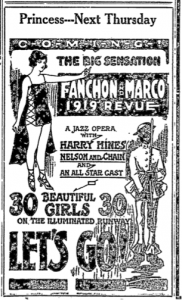Lucille Bogan’s song “Shave Em’ Dry”
Lucille Bogan’s song “Shave ‘Em Dry” breaks the moral barriers that previous music in decades before held, explicitly describing and detailing Bogan’s sexual appetite, desires and sexual ability. Bogan’s honesty and explicitness fits her into the mold that most black women were put in during the 1930’s, as aggressive, hypersexual and sexually promiscuous-in-nature, a mold that she is then liberated from. Bogan sings “I fucked all night / And the night before, baby / And I feel like I wanna fuck some more” explicitly talking about having a lot of sex and enjoying it, notions of sex-positivity and sexual pleasure that were rarely spoken about. By openly playing into racial and gendered stereotypes of black women, “Shave ‘Em Dry” takes the listener on a fun and honest journey of transcendence across those social, racial and gendered conditions, towards acceptance of the significance of Bogan’s power as a black woman. Black female singers like Lucille Bogan grew popular for their refreshing expression of African American culture during a time of ongoing racial tensions and race relations and their unapologetic lyrics containing topics of sex, sexual pleasure and agency.
Advertisement in the Wyoming State Tribune, January 6, 1920

The advertisement in the Wyoming State Tribune was published on January 6, 1920, and promoted a jazz opera with multiple jazz musicians and performers, some acts listed famous for their blackface comedy, like performer Harry Hines. The advertisement shows Harry Hines next to a white woman that is promoting the event, hands outstretched, wearing a tight, strappy dress, with the phrase “30 beautiful girls on the illuminated runway” at the bottom. The advertisement was published during the rise of jazz music, when female singers, African American singers and black female singers, especially, were gaining popularity and fame. The advertisement uses a sexualized image of a woman as the face of the jazz performance and minstrelsy as an act within the show, showing the representations of women and African Americans during the jazz age. With jazz music originating from blues music, which was created by African Americans, the advertisement shows the appropriation of black culture and the discounting of the impact of African American men and women towards jazz music. While women were entering the jazz scene, the advertisement illustrates the highly gendered, hyper sexualized and racialized connotations that the music industry held in the 1920’s.
Estelle Safier McBride’s article “Music as a Career” in Seventeen Magazine, 1946
Estelle Safier McBride’s article “Music as a Career” within Seventeen Magazine in 1946 encourages female readers to think before beginning a career as a musician in an industry where few become successful and financially prosperous. McBride warns readers that a very successful musical career is rare, but mentions ways that musicians can enter the industry through teaching, joining an ensemble, auditioning, getting a scholarship, etc. McBride addresses the audience “you and your parents”, speaking to young women and readers of Seventeen looking for a career path and emphasizes that you have to love music to be a musician, not just be talented or get told you’re talented. The article puts into perspective the realities of the music industry for young women looking to enter in the 1940’s, offering different avenues that women can enter the music industry as composers, orchestral musicians, music arrangers, but not many options for women looking to become singers. McBride highlights that women have made an impact, but acknowledges that they are still entering a masculine industry, writing, “So, although the music field is still man’s territory, women are gaining ground”. McBride’s article is noteworthy to the conventional role of women in music during the 1940’s, who were pushed to join more traditional, less provocative areas of music like orchestral music, music composition and music arrangement, but were warned not to become singers or performers in other areas.
